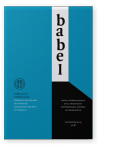Vol. 64:4 (2018) ► pp.579–593
Multiplicity in lieu of authority
Translations of classical Chinese poetry online
Over the past two decades, internet users have been the prolific producers of online English translations of Chinese classical poetry, resulting in multiple variant translations of the same short originals. This essay gives reasons for the popularity of such translations before examining how this corpus can be approached through ‘near-simultaneous reading.’ A case study of ten amateur internet translations of a line from a well-known Tang poem shows how, regardless of the deficiencies or limits of any single internet translation, a richer and more accurate understanding of the original can be achieved through reading several in succession. Insofar as it refrains from privileging any given translation, near-simultaneous reading allows the polysemy of the original to be respected by encounters with multiple versions, and puts the onus of meaning-creation on the reader. Reading in this fashion opens new avenues for imagining the multiple meanings of an original text via variants experienced in quick succession and assembled uniquely.
Article outline
- 1.Introduction
- 2.Near-simultaneous reading of multiple translations
- 3.Case study: A line from Wang Zhihuan’s “Climbing Stork Tower”
- Notes
-
References
